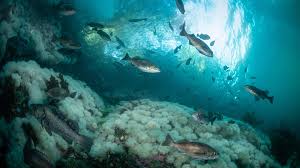The Importance of Marine Biodiversity
Marine biodiversity refers to the variety of life forms that exist in the oceans and other marine ecosystems. It encompasses a wide range of species, from microscopic plankton to massive whales, and includes diverse habitats such as coral reefs, seagrass beds, and deep-sea vents.
Marine biodiversity plays a crucial role in maintaining the health and stability of our planet. Here are some key reasons why preserving marine biodiversity is essential:
Ecosystem Services
Marine ecosystems provide a wide array of ecosystem services that are vital for human well-being. These include food supply, climate regulation, coastal protection, nutrient cycling, and recreational opportunities. A loss of marine biodiversity can disrupt these services, leading to negative impacts on both marine life and human communities.
Genetic Diversity
Marine biodiversity is a rich source of genetic diversity, which can be crucial for the adaptation and resilience of species in the face of environmental changes. Genetic diversity allows species to evolve and survive in changing conditions, making marine ecosystems more robust and sustainable.
Economic Benefits
The oceans support a vast array of economic activities, including fishing, tourism, shipping, and pharmaceutical research. Healthy marine ecosystems with high biodiversity are more productive and resilient, providing greater economic benefits to local communities and industries.
Climate Regulation
Marine biodiversity plays a key role in regulating the Earth’s climate. Marine plants like phytoplankton absorb carbon dioxide from the atmosphere through photosynthesis, helping to mitigate climate change. Additionally, healthy coral reefs and mangrove forests act as carbon sinks and buffer coastal areas against storm surges and erosion.
In conclusion, protecting marine biodiversity is not only essential for the health of our oceans but also for the well-being of all life on Earth. By conserving marine ecosystems and promoting sustainable practices, we can ensure a healthy planet for future generations.
5 Essential Tips to Preserve Marine Biodiversity
- Protect marine habitats such as coral reefs and seagrass beds to support biodiversity.
- Avoid littering and reduce plastic waste to prevent harm to marine animals.
- Support sustainable fishing practices to maintain healthy fish populations in the ocean.
- Be mindful of using chemicals that can harm marine life when near water bodies.
- Educate others about the importance of marine biodiversity and ways to conserve it.
Protect marine habitats such as coral reefs and seagrass beds to support biodiversity.
Protecting marine habitats such as coral reefs and seagrass beds is crucial for supporting biodiversity in our oceans. These habitats serve as vital ecosystems for a wide variety of marine species, providing shelter, food, and breeding grounds. By safeguarding these habitats, we can help preserve the intricate web of life that thrives within them, ensuring the continued existence of diverse marine species and maintaining the balance of our ocean ecosystems. Conservation efforts focused on protecting these critical habitats are essential in safeguarding marine biodiversity for future generations.
Avoid littering and reduce plastic waste to prevent harm to marine animals.
Avoiding littering and reducing plastic waste are crucial steps in protecting marine biodiversity. Marine animals often mistake plastic debris for food, leading to ingestion and entanglement that can be fatal. By being mindful of our waste disposal habits on land and reducing the use of single-use plastics, we can help prevent harm to marine animals and preserve the delicate balance of ocean ecosystems. Every small effort to minimize plastic pollution makes a significant difference in safeguarding the health of our oceans and the diverse species that call them home.
Support sustainable fishing practices to maintain healthy fish populations in the ocean.
Supporting sustainable fishing practices is crucial for maintaining healthy fish populations in the ocean. By adopting sustainable fishing methods such as selective harvesting, avoiding overfishing, and protecting critical habitats, we can help ensure the long-term viability of marine species. Sustainable fishing practices not only safeguard fish populations but also promote ecosystem health and biodiversity, ultimately preserving the delicate balance of marine ecosystems for future generations to enjoy.
Be mindful of using chemicals that can harm marine life when near water bodies.
It is crucial to be mindful of using chemicals that can harm marine life when near water bodies. Chemicals such as pesticides, fertilizers, and oil spills can have devastating effects on marine biodiversity, contaminating water sources and disrupting ecosystems. By choosing environmentally friendly alternatives and properly disposing of hazardous substances, we can help protect the delicate balance of marine life and preserve the health of our oceans for future generations.
Educate others about the importance of marine biodiversity and ways to conserve it.
It is crucial to educate others about the significance of marine biodiversity and effective ways to conserve it. By raising awareness about the diverse life forms in our oceans and the essential role they play in maintaining ecosystem balance, we can inspire action towards their protection. Sharing knowledge about sustainable fishing practices, reducing plastic pollution, supporting marine protected areas, and advocating for policies that safeguard marine habitats are just a few ways individuals can contribute to preserving marine biodiversity for future generations. Education empowers people to make informed choices that benefit our oceans and the entire planet.

